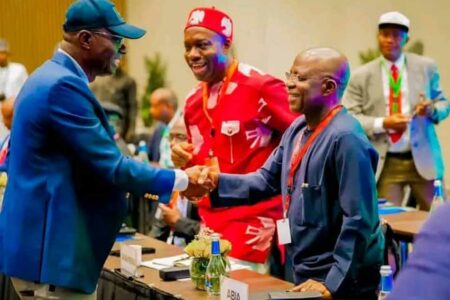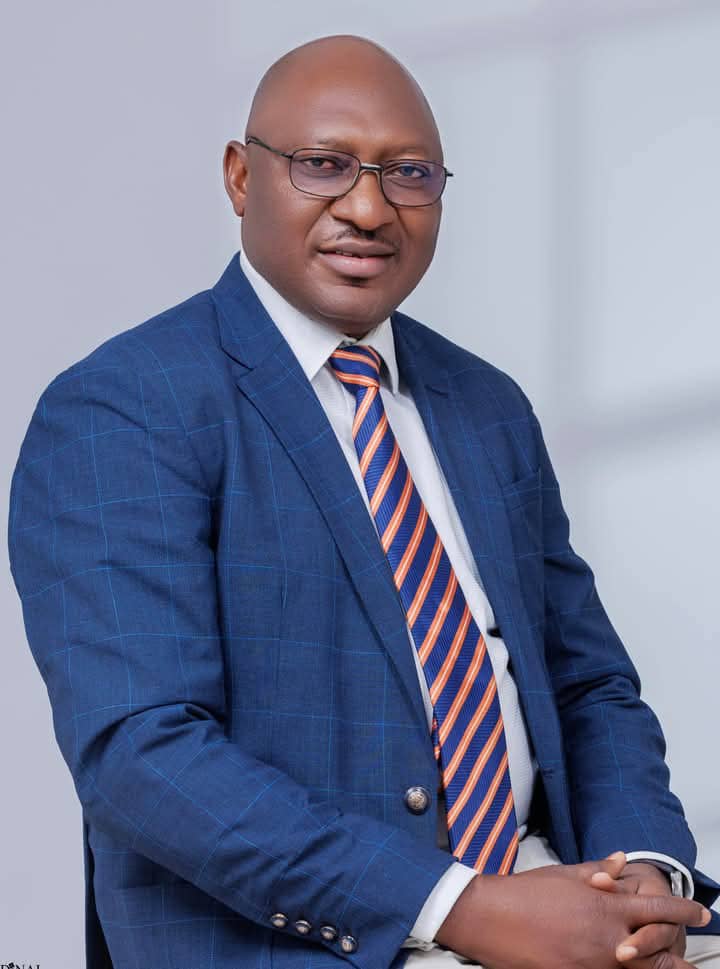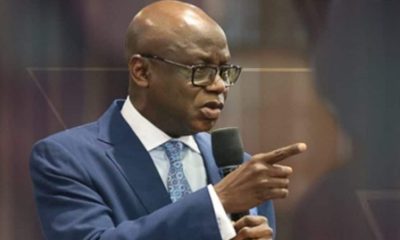Opinion
PLAUDITS FOR OTTI, SOLUDO AND BAGO

By Tunde Olusunle
A video clip which is just about two and half minutes in duration has been trending on the social media in the last few days. It captures the moment top officials of the Abia State government, arrive for a meeting of what could pass as a state executive council meeting, (ASEC), the sub-national variant of the federal executive council, (FEC). The faces of a few of my friends and colleagues indeed stroll past in the short clip. They include Kingsley Agomoh, an Assistant Corps Marshal of the Federal Road Safety Corps, (FRSC) who is on leave-of-absence to help the new administration in Abia and Kazie Uko, my colleague in the old *Daily Times.* Iheanacho Obioma, (we call him *Chomen*), a former federal parliamentarian, also appears in that recording. The curious and discerning will easily know that the venue of that converge is not the designated executive council chambers of Government House, Umuahia.
From the lacquer on the fence of the facility, to the interlocked driveway, and thenceforth to the improvised conference room where the meeting was held, it is obvious this is a private property. I’m indeed told it is the country home of Alex Otti, in Isiala-Ngwa, Abia South senatorial zone. The official address of the governor in Umuahia is probably undergoing renovation. And for Otti that is no reason to negatively impact the course of governance. Each senior Abia State government functionary, secretary to government, chief of staff, commissioner, adviser, technical assistant who walk past in the said video, carried their essentials themselves. They hauled their files, folios, notepads, laptops, handbags, backpacks, to the meeting themselves. There are no squirming, stampeding aides and security details needlessly occupying space, shoving people aside to make way for their principals. And you could see smiles on the faces of some of the officials an attestation to their subscription to the new administrative regimen. Otti, governor of the state himself arrived without fanfare, without ceremony in the said video, holding his mobile phone.
The Alex Otti regime in Abia State is barely one year in office. But the incumbent administration has compelled national attention and admiration to the state for the novel to governance championed by Otti, a former helmsman of the erstwhile Diamond Bank, which has since coalesced into the mega Access Bank. A few months ago, the 141 megawatts *Aba Integrated Power Project, (AIPP),* was commissioned by Nigeria’s Vice President, Kashim Shettima. Reputed to be the first of its kind in Nigeria, it will produce uninterrupted electric power for nine local government areas of the state which is about half the entire Abia State. True it was work-in-progress before Otti’s advent dating back 20 years by the governor’s own admission, the eventual consummation and operationalisation of the initiative was courtesy of the former banker. Critically, the infrastructure will liberate the infinite potentials of Aba, the *Enyimba City* which is the folkloric socioeconomic hub of the state.
Aba’s direct competitor in Nigeria’s South East is Nnewi in Anambra State, an equally vibrant nexus of multilevel entrepreneurial ingenuity. Since he became chief executive of the state two years ago, Chukwuma Soludo the globally recognised economist has worked hard to redefine governance and administration in the state. Soludo came into the job with a virtual truckload of competencies and experience. First, he is a class professor of economics who was called up by the Olusegun Obasanjo/Atiku Abubakar regime to serve first as economic adviser. He was soon after appointed governor of the Central Bank of Nigeria, (CBN), a position from which he superintended over the recapitalisation of Nigerian banks which facilitated their competitiveness in the global financial market. The exercise shrunk the nearly 100 banks, some wobbly and breathless, to 25 solid entities, a process which entailed partnerships and absorptions in many instances.
Soludo signalled his faith in home-made brands when he rode a sports utility vehicle, (SUV) built by the Nnewi-based indigenous vehicle production outfit, *Innoson Motors* to his inauguration in March 2022. The various components of his regalia to his swearing-in ceremony derived from various parts of Anambra State. He inherited a state which had previously assumed worldwide notoriety for large-scale violence. Faceless murderers branded “unknown gunmen” had free reign prawling contiguous streets of communities in the state hunting the innocent like game, in the full glare of the afternoon skies. Abductions, cannibalism, arson were rampant before Soludo’s coming. I had reason in 2021, to engage with the worrying issues in two public discourses, *Unknown Gunmen, November 6 and the Epidemic of Bloodletting* and *Gun Smoke from the East.* It seems the horrendous trends have been on a gradual downward slide, since Soludo’s coming.
Soludo is equally pursuing an aggressive infrastructural development programme. First, he is concerned about congestion in Awka the state capital and Onitsha the commercial capital of the state. His administration is poised to build three new cities. Masterplans for *Awka 2.0,* *Onitsha 2.0* as well as the *Anambra Mixed Industrial City* are being concluded. While those are in the works, Soludo has embarked on a very ambitious road development programme. This encompasses 400 kilometres of roads in the present phase and aims to facilitate seamless commuting by road users. Remediation of failed portions of existing road infrastructure is a regular chore, handled by statutory departments of government and contracting firms. The Soludo government has also been credited with remarkable fiscal prudence, the stuff of the prototype economist.
I began to take studied note of the enterprise of Mohammed Umar Bago the governor of Niger State when I followed his courageous works in the agricultural sector. I was once his guest a few years ago in his Maitama, Abuja home when he was in the House of Representatives. I visited him in company of a mutual friend, Bimbo Daramola who was in the “Seventh Assembly” with Bago. He is a tea aficionado by the way. He is also a dog lover which is a point of mutual convergence between us. Bago began this year by clearing one million hectares of arable land, preparatory to the approaching rainy season. Food security for his constituents is paramount on his agenda. His government has procured a record 500 mega-capacity tractors, as well as irrigation equipment, tillers, water and solar pumps among other accessories, to drive his agricultural vision.
True, Bago ruled against the shipment of truckloads of produce from his state to others earlier this year, in the face of inflation and imminent famine. He is fully cognisant though of the fact that his state has headwind advantage over many others in the country, in the agricultural sector. He is willing to do legitimate, mutually beneficial business. The landmass of Niger State is larger than that of Sierra Leone, by the way. If Niger State was a ravenous python, the belly of the state would effortlessly swallow Gambia and Togo put together! Bago’s administration is willing to partner with other states in agricultural development and exchange which informed the memorandum of understanding, (MOU), signed between Bago and his Lagos State counterpart, Babajide Sanwo-Olu, on behalf of their entities.
Governor Bago has also been unyielding in the battle against sundry criminalities which have held his people helplessly captive over the years. Kidnappings for ransom, routine invasions, occupation of communities by vagrants and wanton banditry, have headlined the security situation in Niger State in recent years. Bago has been at the fore of the mitigation of the situation vis-a-vis increased collaboration with, and support for the security sector in his state. His administration has provided support in terms of motor vehicles and equipments to the various security agencies, to enhance their performance. There is said to be motorised patrol by joint security services which has brought sanity to the state, notably the very important Suleja-Paiko-Minna road.
Bago has also directed the redesignation and remodelling of the moribund *Shiroro Hotel* in Minna as the new *Ibrahim Badamasi Babangida University Teaching Hospital.* The Niger State leader who spots a strikingly luxurious black beard and was a notable banker like the older Alex Otti before his political journey, is redeveloping Minna the state capital, as well as Suleja and Bida into model towns. His fiscal shrewdness evidenced by the fact that he saved N10 Billion from leaking valves within his first four months in office has loosened funds for investment in needy departments of statecraft. Among these is the ongoing construction of roads in all the local government areas of the state to ensure unimpeded movement by commuters and by extension the evacuation of agricultural produce to the secondary markets.
It is instructive that Alex Otti, Chukwuma Soludo and Mohammed Bago belong to different political tendencies, namely: the Labour Party, (LP); the All Peoples’ Grand Alliance, (APGA) and the All Progressives Congress, (APC). What this implies is that if democracy is allowed to grow and fruit without unobtrusive impunity and high-handedness from political high commands, Nigeria can be availed of some of its best across board. Enyinnaya Abaribe the senator representing Abia South for instance, is in the parliament for the fifth successive time for instance. Muscled out of the Peoples’ Democratic Party, (PDP’s) ticket by the immediate past governor of Abia State, Okezie Ikpeazu, Abaribe contested on the platform of APGA and won! Soludo himself had his own share of gravitation from the PDP to the APC before pitching his tent with APGA which ensured his pathway to his present office. Let’s hope that party politics in Nigeria is gradually throwing up some of our best albeit from unanticipated platforms.
Tunde Olusunle, PhD, is a Fellow of the Association of Nigerian Authors, (FANA)
Opinion
Hon. Prof Nnamchi’s Low Social Media Presence Doesn’t Define His Output- A Reply To X User’s Observation

By Titus Agbo
A user on X, formerly Twitter, named Mechelito@Onyema_7, claimed that Hon. Professor Paul Sunday Nnamchi, the member representing of Enugu East/Isi Uzo Federal Constituency in the House of Representatives doesn’t post about the insecurity issues in Eha-Amufu and his efforts to impact his constituents on his X handle, @sunday_nnamchi. The user supported his claim with a screenshot of Nnamchi’s X account page.
However, it’s worth noting that Professor Nnamchi’s low online presence doesn’t necessarily reflect his efforts and output. He was raised by Catholic priests and has a humble disposition. Before venturing into politics, he was involved in humanism, providing free computer training to students in his local government area, Enugu East. This initiative, which aims to expose students to information and communication technology (ICT) education, has trained over 2,000 students as he has since expanded it to accommodate his constituents from Isi Uzo immediately he was elected into the National Assembly.
# Key Achievements
-Scholarships*: Nnamchi has offered scholarships to hundreds of indigent students from various communities within the constituency, including non-indigenes residing in Enugu East/Isi Uzo. Sewed school uniforms for pupils in primary schools and facilitated employments for a few constituents.
– *Infrastructure Development*: He deployed ₦300 million worth of solar-powered streetlights to communities in Enugu East Local Government Area last year and plans to replicate same in Isi Uzo this 2025.
– *Education and Healthcare*: Nnamchi has built and renovated classroom blocks, provided medical outreach programs, and offered free medical treatments and medications to constituents who couldn’t afford them.
– *Security*: He raised a motion on the Eha-Amufu killings on the floor of the House of Representatives on the 19th December, 2023 prompting the House to urge the Inspector-General of Police and the Chief of Army Staff to deploy adequate security personnel to Eha-Amufu and also directed the National Emergency Management Agency, (NEMA) to provide relief materials to the affected victims.
Professor Nnamchi also issued a strongly worded press statement in December 2024 reminding the relevant security agencies of the need to step up their operations in Eha-Amufu. The motion and the subsequent press statement issued the following year when the hoodlums struck again in 2024 were widely reported by both online and major newspapers as can be observed with a few examples of the publications below.
– “Lawmakers Seek Urgent Action To Address Insecurity In Enugu State” by Gloria Essien, Abuja (Voice of Nigeria online, December 4, 2024)
– “Enugu attacks: Reps urge FG to intensify efforts against insecurity in S/E” (Vanguard Newspaper, December 4, 2024)
– “Task FG to address insecurity in South East” by Ndubisi Orji (Sun Newspaper, December 5, 2024).
Nnamchi has sponsored 36 establishment and amendment Bills and numerous motions as at March 2025. The Order Paper, an authoritative in-house journal of the National Assembly, adjudged him the most performing legislator from the Southeast in 2024 ¹.
I want to assure the above X user that all Hon Professor Nnamchi’s social media accounts will be put into proper use henceforth to keep constituents like him updated with Professor Nnamchi’s legislative and constituency engagements.
Titus Agbo, a public affairs analyst wrote from Enugu
Opinion
5G,IoT and AI to boost global GDP by 2030

By Sonny Aragba-Akpore
With Mobile technologies and services now generating around 5.8% of global Gross Domestic Product (GDP) a contribution that amounts to about $6.5 trillion of economic value, there are strong projections that by 2030, this figure will rise to almost $11 trillion, or 8.4% of GDP.
Global System of Mobile Communications Association (GSMA) says much of this will be driven by countries around the world increasingly benefiting from the improvements in productivity and efficiency brought about by the increased take-up of mobile services and digital technologies, including 5G, Internet of Things (IoT) and Artificial Intelligence (AI).
The GSMA recently introduced the 5G Connectivity Index to provide insights into 5G performance in 39 markets in order to encourage informed decision-making.
In terms of Economic Impact,
the GSMA emphasizes the economic benefits of mobile technologies and services, including 5G, projecting that they will contribute significantly to GDP growth by 2030.
“The GSMA provides specific reports and analyses on 5G in different regions, such as Sub-Saharan Africa, Asia ,Middle East among others highlighting the progress and challenges of 5G deployment in specific areas.”
In Sub Saharan Africa for instance with particular attention on Nigeria,South Africa,Egypt,Kenya and Botswana among others some measure of progress in deployment has been recorded.
The rollout of 5G has brought immense benefits across multiple industry sectors, particularly those involving internet of things (IoT) and artificial intelligence (AI) applications in which the real-time transfer of data is crucial.
More broadly, the adoption of 5G is expected to accompany increased data use across the globe, with forecasts anticipating mobile data traffic of over 300 exabytes per month by 2030, more than twice the volume consumed in 2024 according to Statista.
And with a third of global population expected to be covered by this fifth generation (5G) networks ,a technology that has defined new ways of communication by 2025 ,GSMA
says the technology has surpassed growth projections of all times.
“5G subscriptions increased by 163 million during the third quarter 2024 to total 2.1 billion. 5G subscriptions reached close to 2.3 billion by the end of 2024 accounting for more than 25 percent of all global mobile subscriptions.
“4G subscriptions continue to decline as subscribers migrate to 5G” according to GSMA.
As of the first quarter of 2024, there were nearly two billion 5G connections worldwide, with 185 million new additions. This is expected to grow to 7.7 billion by 2028.”
Statistics show that 5G is the fastest-growing mobile broadband technology, reaching 1.5 billion connections by the end of 2023.
It only took four years to reach this number, compared to 10 years for 3G and more than five years for 4G.
“5G is more than a new generation of technologies; it denotes a new era in which connectivity will become increasingly fluid and flexible.5G Networks will adapt to applications and performance will be tailored precisely to the needs of the user” GSMA submits.
By covering one-third of the world’s population , impact on the mobile industry and its customers will be profound according to GSMA.
To deepen the spread of 5G ,GSMA is working closely with the mobile operators pioneering 5G, “by engaging with governments, vertical industries including automotive, financial services, healthcare providers, transport operators, utilities and other industry sectors to develop business cases for 5G.”
And In order to accelerate the growth and spread, many operators are said to be deploying
AI technology as part of an integral part of telecoms operators’ strategic and operational plans.
“Operators are making important advancements in the deployment of AI technology, which is serving as a transformative force shaping the telecoms industry. By deploying autonomous AI-based systems, operators can enhance operational efficiency, customer satisfaction and security, while also creating new revenue opportunities”.
China, South Korea, the United Kingdom, Germany, and the United States are the leading countries with robust 5G coverage in the world.
Since the first commercial launches of the fifth generation of mobile networks in late 2018, these five countries have emerged as leaders because multiple companies in these countries have deployed networks and are selling compatible devices. Countries including Switzerland and Finland are up and comers in 5G development, though they have limited deployment.
In China there are three Companies leading in deployment.
The world’s largest 5G network was launched by the three largest Chinese network operators Oct 31, 2019, according to the state-run news agency Xinhua. These are China Mobile, China Unicom, and China Telecom which all activated their networks in less than five months after they were issued 5G licenses.
Each of the network operators offered their 5G services at $18 per month in 50 Chinese cities at the beginning of the launch.
GSMA expects 36% of China’s mobile users to be using 5G by 2025. That’s about 600 million subscribers, who would also make up 40% of the entire global 5G market by this year.
This is all despite efforts made by the United States government to hamper the progress of Chinese vendors, though those efforts may affect how Chinese companies may expand into the global market.
In South Korea,SK Telecom and Korea Telecom run as the main competitors for the South Korean 5G market.
SK Telecom acquired spectrum in the 3.5 GHz and 28 GHz frequencies to prepare for deploying 5G.
In April of 2019, the Enterprise claimed to be the first mobile carrier in the world to launch 5G services to work on 5G smartphones. SK Telecom asserted an edge over rival Verizon, as the former launched 5G services available at the same time as Samsung Galaxy S10 5G smartphone launched in South Korea. Verizon launched mobile 5G services in the U.S. before a 5G enabled smartphone was available to U.S. consumers.
SK Telecom also conducted tests with a 5G Standalone (SA) Core (a core not reliant on the 4G network) for their 5G network in cooperation with Samsung Electronics.
The world’s largest 5G network was launched by the three largest Chinese network operators Oct 31, 2019, according to the state-run news agency Xinhua. These are China Mobile, China Unicom, and China Telecom which all activated their networks in less than five months after they were issued 5G licenses. Each of the network operators offered their 5G services at $18 per month in 50 Chinese cities at the beginning of the launch.
“What we are seeing is a concerted effort by the Chinese — the operators, vendors, and government regulators — to deploy 5G as quickly as possible,” Chris Nicoll, principal analyst at ACG Research, pointed this out in a November 1, 2019 SDxCentral article.
With all of these players working together, the three network operators had collectively deployed nearly 86,000 5G base stations peaked over 130,000 by the end of 2019. The latter number breaks down into China Unicom and China telecom, with each planning to install 40,000 base stations, and the market leader China Mobile to install 50,000.This was the projection by 2019 but they have since overshot this by the beginning of 2024.
The International Telecommunication Union (ITU), says 5G coverage reached 40% of the world’s population in 2023 with an uneven coverage and distribution with developed countries having more coverage than low-income countries:
In Europe ,68% of the population is covered and
Americas had 59% of the population covered while
Asia-Pacific has 42% of the population covered as at 2023.
Arab States have 12% of the population covered.
Commonwealth Independent of States (CIS) had 8% of the population covered.
ITU figures show Africa,s coverage rose to 10 % of the population by 2023 .
The ITU also notes that 90% of the world’s population is covered by 4G, but 55% of people without access to 4G live in low-income countries because In low-income countries, 3G is often the only technology available to connect to the Internet.
The ITU develops and adopts international regulations and global standards to enable the harmonization and implementation of broadband mobile networks.
In Africa, around a dozen nations have launched services including Botswana, Kenya, Mauritius, Madagascar, Nigeria, Seychelles, South Africa, Tanzania, Togo, Zimbabwe, and Zambia but Africa is a patchwork of 54 countries.
And penetration is predicted to be slow.
By 2027, Ericsson predicts that 80 percent of phone users in Europe will have 5G service.
At the same time, 5G subscriptions in Africa, home to 1.4 billion people, May stagnate at a little over 10 percent. Why will so few people in Africa get access to 5G services?
China, South Korea, the United Kingdom, Germany, and the United States remain the leading countries with robust 5G coverage in the world.
While many countries are already providing robust services,Africa remains on the outskirts of 5G services.
The countries in Africa that have launched 5G networks, include South Africa with its roll out
In March 2022, when the Independent Communications Authority of South Africa (ICASA) sold spectrum across several bands.
In Nigeria,MTN rolled out commercial 5G services in Lagos in 2022, with other roll out in Abuja, Port Harcourt, Ibadan, Kano, Owerri, and Maiduguri among others.
MTN Congo announced that it was the first country in Central Africa to deploy 5G.
In Botswana Orange deployed 5G technology to provide new services in the Gaborone and Francistown regions.
Other countries in Africa that have launched 5G Fixed Wireless Access (FWA) services include: Angola, Kenya, Zambia, and Zimbabwe.
Analysts say “5G’s potential is growing due to its ability to deliver fiber-like speeds. However, there are still challenges in the region, such as:
Urban areas are reaching their maximum capacity whereas a large portion of the population lives in rural areas.
This explains why 5G adoption in the sub-Saharan region is currently below six percent “
Analysts report that 5G deployment in Africa faces many challenges, including Spectrum assignment,regulatory issues,infrastructure,security,financial resources among others.
“Spectrum is a limited resource that is already in use by other services, such as TV broadcasters and satellite operators. Governments need to open up frequencies and grant 5G licenses at reasonable prices. “
Infrastructure is another major challenge.
“5G networks require a large initial investment, including expensive devices, antennas, and Radio Access Network (RAN) hardware. The infrastructure needs to be fiberized to support 5G services.
Regulatory conditions also serve as challenges to deployment.
For instance “regulatory authorities may not have started the process for licensing and granting frequencies in the right portion “
“Most of the equipment and devices required for 5G deployment need to be imported.”
There are also security challenges that make
5G technology vulnerable to cyber security threats, such as tracking calls and exposing user locations.
Opinion
Right of Reply: THE PUNCH AND BUSYBODY BUSINESS

The recent declaration of a State of Emergency in Rivers State has triggered diverse commentaries from a wide range of Nigerians.
Almost everyone hailed the presidential proclamation because of the visible threat to law and order in the state at the time the action was taken. Of course, there were a few naysayers who read political meanings into an otherwise sincere and prompt intervention.
One such negative interpretation is the position taken by the Editorial Board of The Punch newspaper. In one of its editorials published on the matter, the national daily claimed that the entire crisis was caused by what it described as “the needless meddlesomeness in the governance of the state by its former governor and Tinubu’s Federal Capital Territory Minister, Nyesom Wike….” It is unfortunate that this narrative and others like it have become commonplace in the media space.
How did the Editorial Board of a reputable newspaper arrive at such a conclusion? Their claim that the Sole Administrator, Admiral Ibok Ete Ibas (rtd), has been acting a script purportedly written by the Minister of the Federal Capital Territory, Nyesom Wike, is also faulty and has no iota of truth.
They also faulted the sacking of all political appointees who served in Governor Siminalayi Fubara’s administration, insinuating that their replacements were drawn from Wike’s political camp. Again, nothing can be further from the truth.
Since his appointment as the Sole Administrator of Rivers State, Admiral Ibok Ete Ibas has been running the state with the abundant human resources available in the state and has not imported anybody from outside the state. Did the Editors of The Punch really expect him to run the administration with the politicians loyal to the suspended governor?
Do they not know that the crop of political appointees who served Fubara would have found it difficult to work with the Sole Administrator?
Certainly, they know the truth, but they have chosen to stoke the fire to generate more tensions in Rivers State.
Certain interests might have commissioned this editorial to cast aspersions on the Sole Administrator and raise doubts about his capacity to run the state.
It may also have been the handiwork of Wike’s political detractors, the man whom many politicians love to hate for no other reason than envy and jealousy.
We urge the Punch newspapers to seek a better mode of intervention in the political situation and not dwell on innuendos and unsubstantiated allegations against certain political actors in order to blackmail them.
Dr Ike Odogwu
-

 News12 hours ago
News12 hours agoBREAKING! Pope Francis is dead
-

 News9 hours ago
News9 hours agoUPDATED: How Pope Francis transited, last activity, health challenges, others
-

 News16 hours ago
News16 hours agoRetirees with outstanding loans may lose property – FG
-

 News16 hours ago
News16 hours agoSad as hotelier slumps, dies at wife’s 60th birthday thanksgiving
-

 Metro17 hours ago
Metro17 hours ago77-year-old Nigerian Uber driver shot dead in US, passenger in critical condition
-

 News12 hours ago
News12 hours agoFemi Ojudu: We Understand His Bitterness Being A Political Coupist– Lere Olayinka bombs Ojudu over comment on wike
-

 News16 hours ago
News16 hours agoBakare criticizes Tinubu, says his ‘motor park’ politics has destroyed NASS
-

 Politics12 hours ago
Politics12 hours agoSenate postpones resumption of plenary sittings to May 6





